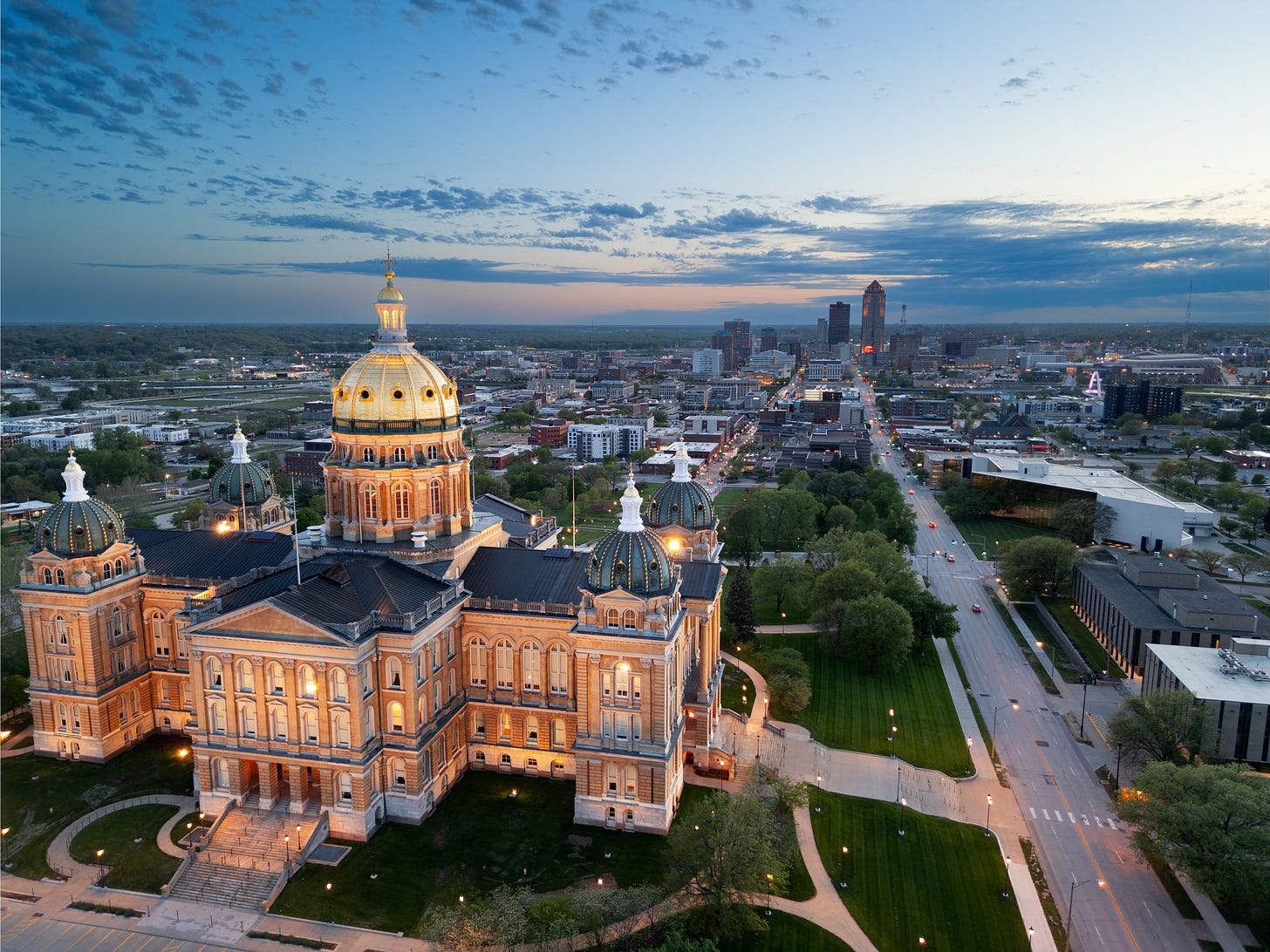The Veto That Has Rocked Rural Iowa
Kim Reynolds’ Veto: A Victory for Special Interests, a Loss for Rural Iow
Carbon Capture or Power Grab?
How Summit’s $8.9 Billion Pipeline Sparked a Rural Uprising Across the Midwest
“The Largest Carbon Pipeline in History”
Across the heartland, a battle is raging not just for farmland, but for the future of energy policy, property rights, and political influence. At the center of it all stands Summit Carbon Solutions—a $8.9 billion gamble to build the nation’s largest carbon-capture pipeline, stretching more than 2,000 miles through five Midwestern states. Proponents call it a lifeline for ethanol and rural economies. Opponents see a machine fueled by big money and political favoritism, steamrolling property rights in the name of “green” progress.
The Summit Project: Scope, Scale, and Stakes
Summit Carbon Solutions aims to collect carbon dioxide from roughly 57 ethanol plants and ship it through a sprawling pipeline web across Iowa, Minnesota, Nebraska, South Dakota, and North Dakota. The final destination: underground storage deep beneath western North Dakota (reuters.com).
Investment so far: Over $1 billion already spent, including nearly $175 million in payments to more than 1,300 Iowa landowners for voluntary easements (ktiv.com).
Total project cost: $8.9 billion.
Permitting Patchwork:
Approved: Iowa (June 2024), Minnesota, North Dakota
Denied: South Dakota (2024, again in April 2025) and passed a ban on eminent domain for CO₂ pipelines (reuters.com)
Ongoing: Nebraska (no permitting process; legal wrangling continues)
Supporters, mainly from the ethanol and agribusiness sectors, argue the line is critical to keep biofuels viable and open up lucrative low-carbon markets. Opponents—a diverse coalition of farmers, landowners, and environmental groups—warn it sets a dangerous precedent for eminent domain, threatens safety, and hollows out property rights (kcci.com).
The Veto That Rocked Rural Iowa
House File 639: The Landowners’ Bill
The Iowa legislature passed House File 639 in early June 2025. Its provisions:
Tightened requirements for using eminent domain (pipeline companies would have to be “common carriers”).
Limited CO₂ pipeline permits to a single 25-year term.
Required strict insurance coverage.
Made renewals harder.
For rural landowners—some now on the receiving end of lawsuits from Summit—it was a rare bipartisan win. But Governor Kim Reynolds vetoed the bill, claiming it would jeopardize Iowa’s leadership in biofuels and create regulatory chaos (apnews.com), (Iowa Capital Dispatch).
She promised to support “landowner protections” and “transparency” through executive and commission action instead of law, but critics saw the move as a direct concession to pipeline developers.
Follow the Money: Who Funds the Pipeline Push?
Behind the scenes, the fingerprints of big political money are everywhere.
Bruce Rastetter: Kingmaker and Pipeline Boss
Bruce Rastetter, founder of Summit Agricultural Group and Summit Carbon Solutions, is one of Iowa’s most prolific political donors. Between 2018 and 2022, he donated at least $150,000–$189,000 to Governor Reynolds, with more to House Speaker Pat Grassley and Senate Majority Leader Jack Whitver (reuters.com).
Other Summit and Navigator pipeline executives have contributed to the same top GOP leaders.
Summit also hired former chiefs of staff to both Governor Reynolds and former Gov. Terry Branstad—cementing inside access to Iowa’s regulatory process (foodandwaterwatch.org).
Regulatory and Legislative Shielding
Former Gov. Branstad’s appointees to the Iowa Utilities Board (IUB) were instrumental in clearing Summit’s permit hurdles (Des Moines Register).
Reynolds’ own veto drew immediate criticism as an act to “shield” Summit from oversight, especially with substantial donor overlap.
The Rural Resistance: Lawsuits, Threats, and Security Guards
For many, the Summit saga is less about climate than control.
Aggressive Tactics
Summit has filed at least 232 eminent domain lawsuits against unwilling landowners across the region—156 in South Dakota alone, with 83 cases filed in just two days (apnews.com).
Landowners describe intimidation:
“If you don’t sign, we’re going to file eminent domain on you and you’re going to get nothing compared to what we’re offering you.”
—LeRoy Braun, South Dakota farmer (newsday.com)
Armed security guards were reported by several landowners during survey work, a charge Summit disputes (finance-commerce.com).
Legal Muscle
Summit’s attorneys sent cease-and-desist letters to at least six critics—including activists and farm broadcasters—demanding retractions for “false and defamatory” statements (thegazette.com), (ehn.org).
Farmer Jared Bossly faced a court motion by Summit to hold him in contempt after a confrontation with surveyors, further escalating tensions (reuters.com).
Chilling Free Speech
Opponents like Jess Mazour of the Sierra Club say legal threats are meant to silence dissent:
“This is clearly an intimidation attempt just to keep us quiet and hamper our free speech rights.”
The Political Chessboard: What’s Next?
With Reynolds’ veto, legislative action is stalled. House Speaker Pat Grassley is now circulating a petition to call a special session and override the veto—a move that appears doomed in the Senate, where leadership is refusing to challenge the governor (kcci.com).
The Iowa Utilities Commission
Governor Reynolds has urged the IUC to voluntarily adopt some of the transparency measures from the failed bill—like requiring public meetings and more commissioner attendance—but for many rural residents, trust is broken.
Landowners Mobilize
Opponents are organizing for 2026, aiming to elect candidates who’ll defend property rights and reignite the pipeline debate. Direct action, legal challenges, and media campaigns are all on the table.
Summit’s Construction Timeline
With permits in hand and voluntary easements growing, Summit moves forward in Iowa and beyond, even as lawsuits and grassroots campaigns threaten delays elsewhere.
A “Green” Power Struggle
Summit Carbon Solutions’ pipeline is marketed as a solution to climate change and rural economic decline. But its path has been marked by lawsuits, intimidation, and the outsized influence of a handful of wealthy donors. The fight is no longer just about carbon capture—it’s about who decides the future of the American heartland.
For Iowa’s farmers and landowners, the pipeline represents a turning point. Will political money and corporate clout reshape rural life in the name of climate? Or will local resistance force a new reckoning over property, power, and democracy in the Midwest?
Citations:




